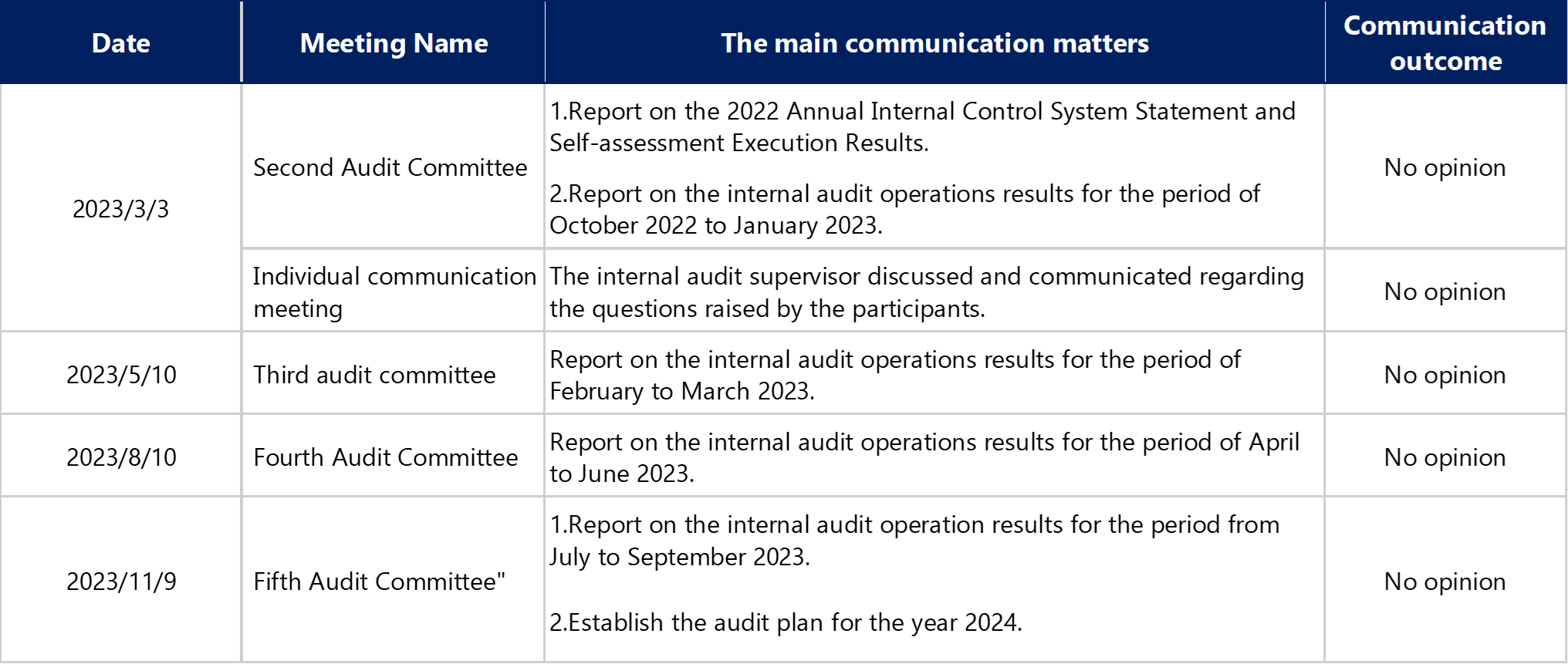Board of Directors and Functional Committees
The board of directors
The board of directors' responsibilities
The board of directors' primary task is to create the maximum benefit for shareholders, and its main responsibilities are to review the operational plan and financial statements, establish the internal control system and assess its effectiveness, and audit major financial business matters. To fulfill the duty of supervision, the board of directors establishes functional committees, including the audit committee and the remuneration committee, and the members of the committees have professional abilities and qualifications.
Director's resume:(Current Term of Office:2023/05/30~2026/05/29)
Diversity and Implementation Status of the Board of Directors
The nomination and selection of members of the board of directors of our company are based on a candidate nomination system. In addition to evaluating the qualifications of each candidate, we also consider the opinions of various stakeholders and follow the "Director Election Regulations" and the "Investors' Practical Guidelines" to ensure the diversity and independence of the board members.
The "Investors' Practical Guidelines" of our company clearly stipulate that the composition of the board of directors should take into account diversity, and that directors who concurrently serve as company managers should not exceed one-third of the seats on the board of directors. The board should also formulate appropriate diversification policies based on its own operations, business models, and development needs, including but not limited to gender, age, nationality, and culture. The board as a whole should generally possess the knowledge, skills, and qualities necessary to perform its duties. To achieve the ideal goal of investors, the board as a whole should possess the following abilities: (1) operational judgment ability, (2) accounting and financial analysis ability, (3) management ability, (4) crisis handling ability, (5) industry knowledge, (6) international market perspective, (7) leadership ability, and (8) decision-making ability.
The current policy and implementation of diversification of the members of the board of directors of our company are as follows:
One of our company's directors holds an employee position, accounting for 13% of all board members. Four independent directors hold 50% of all board member positions and have not been re-elected for more than three terms. One female director holds 13% of all board member positions. Two directors aged 51-60 hold board member positions, six directors aged 61-70 hold board member positions, and no directors aged 71-80 hold board member positions. Our management goals of having at least one female director and having the number of independent directors exceed one-third of the total number of directors have been achieved.
Audit Committee
Members of the Audit Committee
The Audit Committee of the company is composed of all independent directors. For the members' profiles, please refer to the directors' resumes.
Responsibilities of the Audit Committee
The main purpose of the operation of this committee is to supervise the proper expression of the company's financial statements, the selection (dismissal) and independence and performance of the certified public accountant, the effective implementation of the company's internal control, the company's compliance with relevant laws and regulations, and the control of existing or potential risks of the company.
The main duties of this committee are as follows:
- 1. Formulate or revise the internal control system in accordance with Article 14-1 of the Securities and Exchange Act.
- 2. Assess the effectiveness of the internal control system.
- 3. Formulate or revise the processing procedures for significant financial business activities such as acquiring or disposing of assets, engaging in derivative commodity transactions, lending funds to others, endorsing or providing guarantees for others in accordance with Article 36-1 of the Securities and Exchange Act.
- 4. Matters involving the personal interests of directors themselves.
- 5. Significant asset or derivative commodity transactions.
- 6. Significant lending, endorsement, or guaranteeing of funds.
- 7. The issuance, offering, or private placement of equity securities.
- 8. Appointment, dismissal, or remuneration of certified public accountants.
- 9. Appointment or dismissal of financial, accounting, or internal audit supervisors.
- 10. Annual Financial Reports and Semi-Annual Financial Reports.
Compensation Committee
Compensation Committee
The Compensation Committee of our company is composed of the following members. Please refer to the director's resume for the member profiles.
Compensation Committee Responsibilities
The Compensation Committee shall exercise due care of a good administrator, faithfully perform the following duties, and submit the proposed recommendations for discussion at the board of directors:
- 1. Regularly review the organizational regulations of the Compensation Committee and propose revision suggestions.
- 2. Formulate and regularly review the performance evaluation standards, annual and long-term performance goals, and policies, systems, standards, and structures of the directors and managers of our company, as well as the compensation and benefits. The content of the performance evaluation standards should be disclosed in the annual report.
Communication between Independent Directors and Heads of Internal Audit, as well as Accountants
Principles of Communication between Independent Directors, Internal Audit Executives, and Auditors
- I、At least once a year, a separate communication meeting is convened between independent directors and the internal audit supervisor, as well as the accountant, to discuss and communicate on matters such as the internal audit situation and external audit opinions.
- II、In the event of significant abnormal incidents, the aforementioned personnel deem it necessary to communicate relevant matters separately and may convene meetings at any time. Independent directors, internal audit executives, and accountants all have direct communication channels, facilitating real-time discussions as needed.
Communication between Independent Directors and Auditors

The communication between independent directors and internal audit executives




